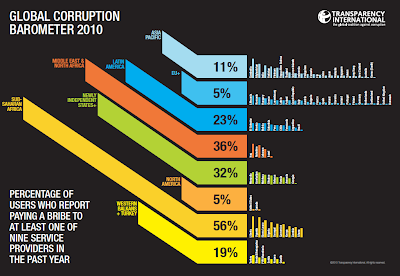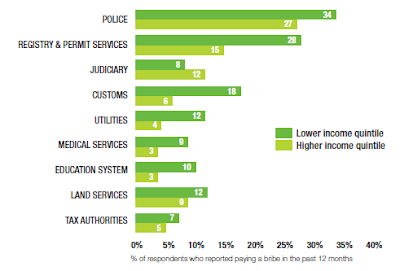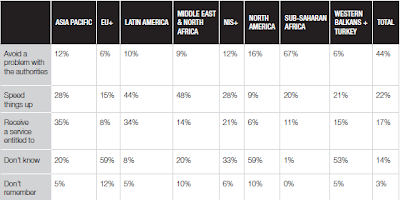The section on petty bribery in particular makes for fascinating reading. Nearly 77000 people were asked to rate their experiences over the past 12 months with nine of the commonest public service delivery departments. Interestingly, India came in the top-tier of countries where respondents reported to having paid a bribe to access nine public services over the past 12 months - 54% of Indians reported to having paid bribes.

The police emerged as the most corrupt of departments, with nearly three of ten people who had contact with police reporting that they paid bribes. In fact, people in Asia Pacific and Latin America reported that judiciary was the most corrupt institution.

Capturing the regressivity of petty bribes, the survey finds that poor people are more frequently penalized with bribes. They pay bribes more frequently than the rich in eight out of the nine services.

Nearly half the people report that their last bribe was to "avoid a problem with the authorities", nearly a quarter to "speed things up". Interestingly, in Asia Pacific, 35% of people last paid bribes to "access a service they are entitled to" and 28% to "speed things up".

1 comment:
(I find it strange poor paid more bribes than rich when it comes to 'tax Authorities'. It is, at least in India, very unlikely case)
Clearly a corrupt system is anti-poor and pro-rich. The fact majority of the bribes were for "access a service they are entitled to" / and "speed up things" indicate a strong case for systems like eSeva. Poor will be happy to pay 'smaller' price than that they pay as bribe today. Changing people's mind set will take long. we should try to build more automated systems so the 'need' for most the 'privileged' service is gone. I hope Aadhar (Ignoring all my scepticism towards it) will bring a marked change in providing basic services faster and cheaper.
Post a Comment